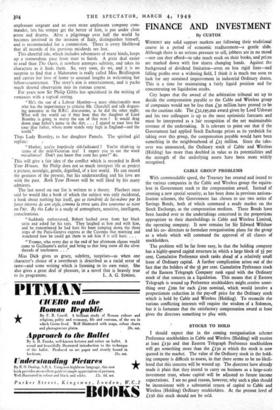FINANCE AND INVESTMENT
By CUSTOS Wrrifoifr any solid support markets are following their traditional course in a period of economic readjustment—a gentle slide. Although there is no serious pressure to sell, jobbers are in no mood —nor can they afford—to take much stock on their books, and prices are marked down with few shares changing hands. Against the background of dividend limitation—even on less rigid lines—and falling profits over a widening field, I think it is much too soon to look for any sustained improvement in industrial Ordinary shares. This is a time for maintaining a fairly liquid position and for concentrating on liquidation stocks.
City hopes that the award of the arbitration tribunal set up to decide the compensation payable to the Cable and Wireless group of companies would not be less than £30 million have proved to be on the cautious side. The £32,195,000 award given by Lord Uthwatt and his two colleagues is up to the most optimistic forecasts and must be interpreted as a fair recognition of the net maintainable revenue of the undertaking. It is relevant to point out that if the Government had applied Stock Exchange prices as its yardstick for taking over this group, the compensation payable would have been something in the neighbourhood of £25 million. Since the take- over was announced, the Ordinary stock of Cable and Wireless (Holding) has more than doubled in value as its potentialities and the strength of the underlying assets have been more widely recognised.
CABLE GROUP PROBLEMS
With commendable speed, the Treasury has created and issued to the various companies in the Cable and Wireless group the equiva- lent in Government stock to the compensation award. Instead of creating a .new special security, as has been done in previous nationa- lisation schemes, the Government has chosen to use two series of Savings Bonds, both of which command a ready market on the Stock Exchange, as the compensation medium. These Bonds have been handed over to the undertakings concerned in the proportions appropriate to their shareholdings in Cable and Wireless Limited, the operating company. It now remains for Sir Edward Wilshaw
and his directors to formulate reorganisation plans for the group as a whole which will command the approval of all classes of stockholders.
The problem will be far from easy, in that the holding company has a highly-geared capital structure in which a large block of 51 per cent. Cumulative Preference stock ranks ahead of a relatively small issue of Ordinary capital. A further complication arises out of the fact that the holders of the 31- per cent. Cumulative Preference stock of the Eastern Telegraph Company rank equal with the Ordinary stock of that concern in a liquidation. This means that if Eastern Telegraph is wound up Preference stockholders might receive some- thing over Lzoo for each £roo nominal, which would involve a proportionate reduction in the pay-off price for the Ordinary stock which is held by Cable and Wireless (Holding). To reconcile the various conflicting interests will require the wisdom of a Solomon, but it is fortunate that the satisfactory compensation award at least gives the directors something to play with.
STOCKS TO HOLD
I should expect that in the coming reorganisation scheme Preference stockholders in Cable and. Wireless (Holding) will receive at least £130 and that Eastern Telegraph Preference stockholders will get something more than the £130 at which the stock is now quoted in the market. The value of the Ordinary stock in the hold- ing company is difficult to assess, in that there seems to be no likeli- hood that this concern will be wound up. The directors have already made it plain that they intend to carry on business as a large-scale investment trust, whose capital will be adjusted to future income expectations. I see no good reason, however; why such a plan should be inconsistent with a substantial return of capital to Cable and Wireless (Holding) Ordinary stockholders. At the present level of £236 this stock should not be sold.






































 Previous page
Previous page